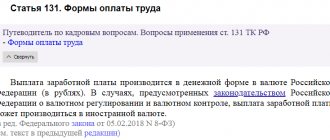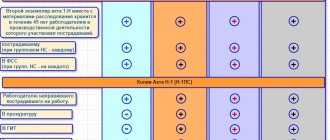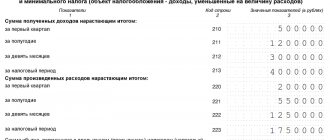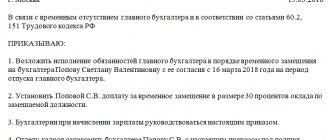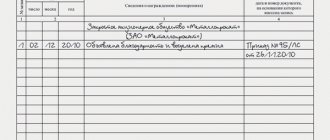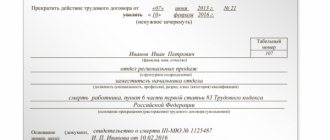Encouraging employees who conscientiously perform their job duties
In accordance with Art. 191 of the Civil Code of the Russian Federation “the employer encourages employees who conscientiously perform their job duties.” The above wording of the law allows us to conclude that the employer is obliged to reward a conscientious employee, and the employee, due to the conscientious fulfillment of the duties assigned to him by the employment contract, has a subjective right to a one-time (one-time) incentive. In fact, Art. 191 of the Labor Code of the Russian Federation does not oblige, but gives the employer the right to reward a conscientious employee. The assessment of the employee’s integrity in the hiring process is made by the employer. In the Labor Code of the Russian Federation of 1971, such an assessment took into account the opinion of the corresponding elected trade union body of the enterprise, institution, or organization. The employer was obliged to coordinate its opinion (assessment) on employee incentives with the elected trade union body. According to Art. 132 of the Labor Code of the Russian Federation, measures to encourage workers were applied “by the administration jointly or in agreement with the relevant elected trade union body.” This procedure to a certain extent excluded the subjectivity (personal discretion) of the employer in the process of one-time incentives for employees.
The grounds for one-time incentives can be distinguished as general and special. The general basis for encouraging an employee is a high level of compliance with his job duties and labor discipline in the organization. The general basis of incentives can be applied not only together with the special one, but also independently. Special grounds for one-time incentives are the achievement of outstanding success in work (increasing labor productivity, improving product quality, innovation, invention, rationalization activities, etc.); long-term work in one organization; training; comprehensive assessment of the work of an employee or team. Such grounds may be provided for in internal labor regulations, a collective agreement, and other local regulatory legal acts. It also sets out incentive measures and the procedure for their application. Special incentive grounds are applied if there is a general basis. An undisciplined, unscrupulous employee is not rewarded even if there is a special reason, for example, for success in rationalization, invention, etc.
There are moral and material measures of one-time (one-time) encouragement. In Art. 191 of the Labor Code of the Russian Federation establishes an open list of them: gratitude, bonus, valuable gift, certificate of honor, title of the best in the profession. Other measures to reward employees for success at work, as already noted, are enshrined in the collective agreement, internal labor regulations, as well as charters and discipline regulations. For special labor services to society and the state, employees can be nominated for state awards (Part 2 of Article 191 of the Labor Code of the Russian Federation).
In market economic conditions, moral incentive measures are usually used in combination with material incentives. Some incentive measures combine both material and moral incentives for conscientious work (valuable gift, promotion at work, promotion, etc.).
Jurisprudence
Final provisions
The final provisions can be devoted to the issues of sources of financing of material incentives for employees. For example, the fact that material incentives are provided only at the end of the quarter in the case of successful financial performance (Example 6).
Example 6. Excerpt from the Regulations on bonuses for employees of Burovaya Vyshka LLC
<�…>
3.1. The decision on the payment and amount of the bonus is made by the General Director based on the financial capabilities of the Company, based on data from accounting and statistical reporting, management and operational accounting. A certificate of the financial condition of the company is prepared by the financial director of the Company in agreement with the chief accountant of the Company and the executive director of the Company.
<�…>
Let us also draw attention to the fact that it will be convenient for the employer, as appendices to the local regulatory act, to approve sketches of gratitude, certificates of honor, photographs and the necessary information for the honor board, as well as to indicate the wording of the titles “Best in the Profession”, for example, “Excellence in Labor”, “Best senior comrade”, etc.
General requirements for bonuses
The employer rewards employees who conscientiously perform their job duties. In particular, by paying bonuses. He has the right to establish various bonus systems, incentive payments and allowances (Article 135 of the Labor Code of the Russian Federation).
When paying bonuses and developing documents for bonuses to employees, the following must be taken into account.
1. Local regulations, including bonuses, should not worsen the employee’s position in comparison with the current legislation (Article 8 of the Labor Code of the Russian Federation).
2. A mandatory condition for inclusion in any employment contract is the condition on remuneration (Article 57 of the Labor Code of the Russian Federation), therefore the employer must indicate the possibility of making incentive payments in the text of the employment contract. In addition, the employer cannot unilaterally cancel bonuses if they are provided for in the employment contract.
3. Labor costs include bonuses for production results, bonuses to tariff rates and salaries for professional excellence, high achievements in work and other similar indicators (Article 255 of the Tax Code of the Russian Federation, hereinafter referred to as the Tax Code of the Russian Federation). That is, the employer must establish production indicators for which bonuses are provided. These may, for example, include: for a sales manager - the number of concluded and actually executed contracts, for a lawyer - the amount of debts collected in court or through claims, VAT amounts recovered through administrative or judicial procedures, disputed amounts of additional taxes and fees, fines and etc. Such indicators can be established in plans and confirmed by reports on work performed.
4. Expenses must be economically justified and documented (Article 252 of the Tax Code of the Russian Federation). Therefore, if a company suffers losses, then the payment of large bonuses for production indicators by the tax authority may be considered unlawful.
How to reward employees or Let's talk about bonuses
Elena SITNIKOVA Lawyer
The topic of many articles in a variety of publications has long been the question of how to punish negligent workers, bring them to various types of liability, or recover the material damage they caused.
Meanwhile, at times, even the most careless workers begin to work hard, so much so that the employer immediately wants to encourage them in some way. The Labor Code of the Russian Federation has a very positive attitude towards such impulses of employers and in Article 191 establishes that employees who conscientiously perform their job duties can be encouraged by declaring gratitude, paying a bonus, awarding a valuable gift, a diploma of honor, or nominating them for the title of the best in their profession. If you want to thank your employees in some way, then there is no prohibition on such a step: other types of employee incentives must be included in the collective agreement, in the internal labor regulations of the organization, or in the charter or discipline regulations. The special labor services of your employees to society and the state may well lead to their nomination for state awards.
